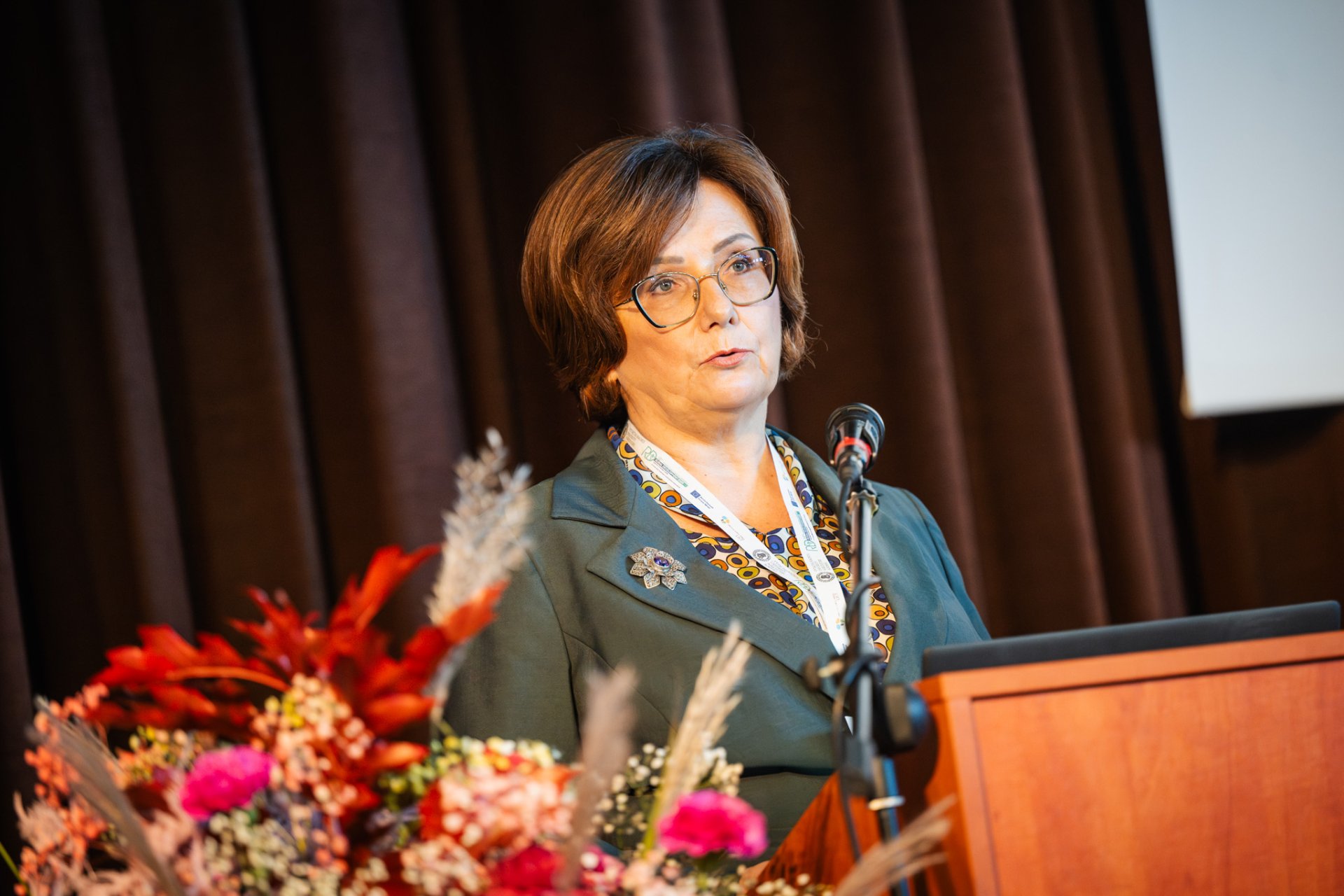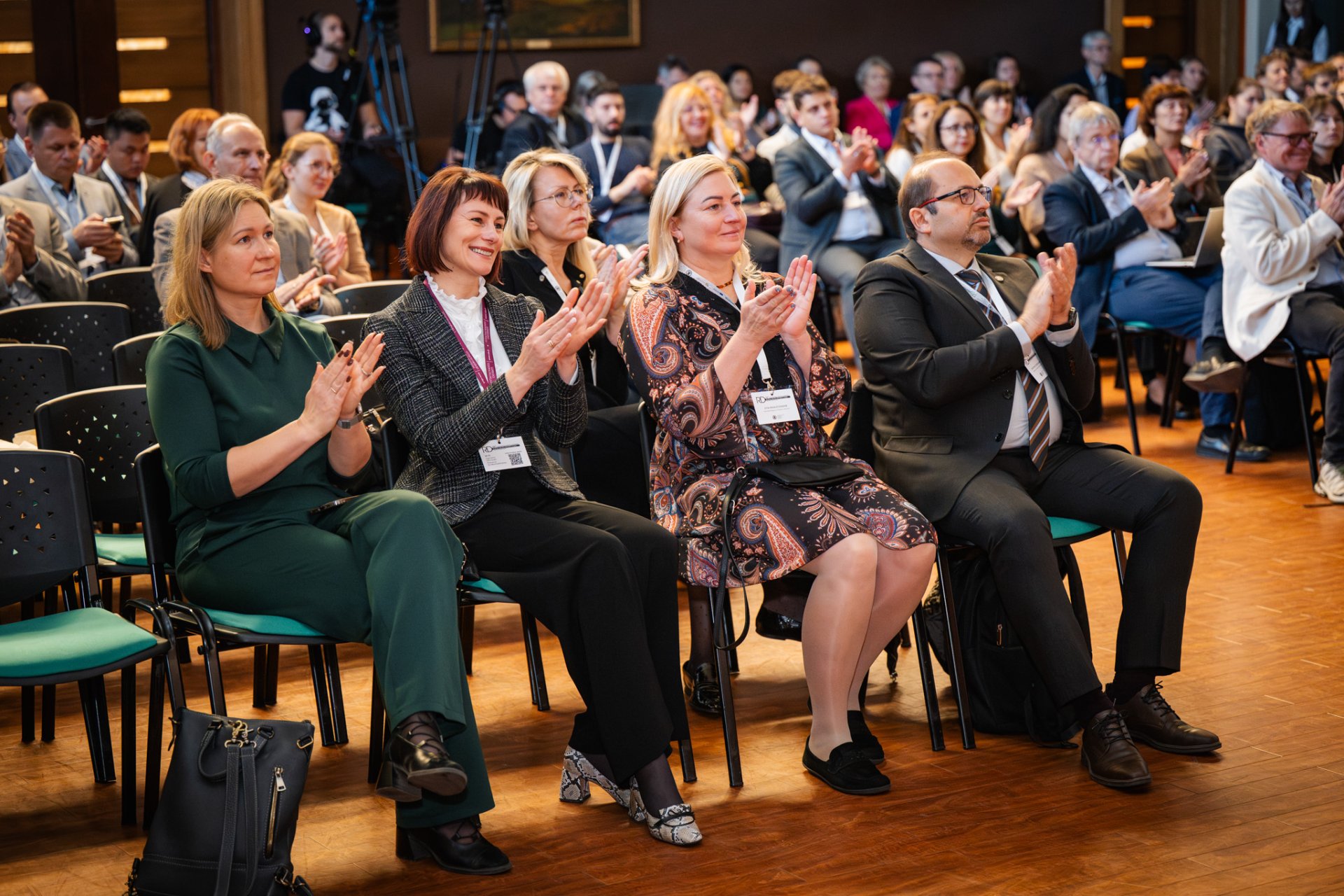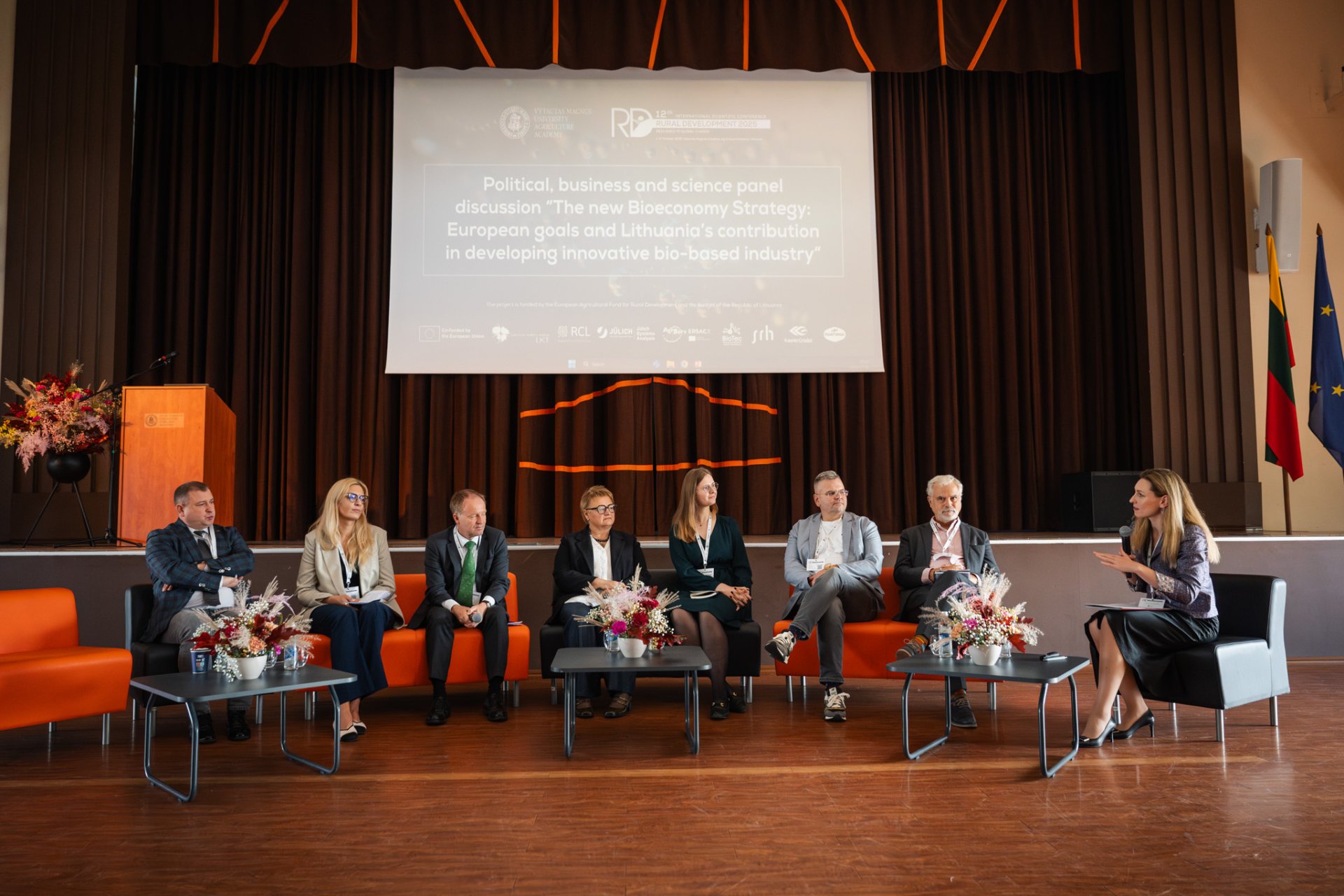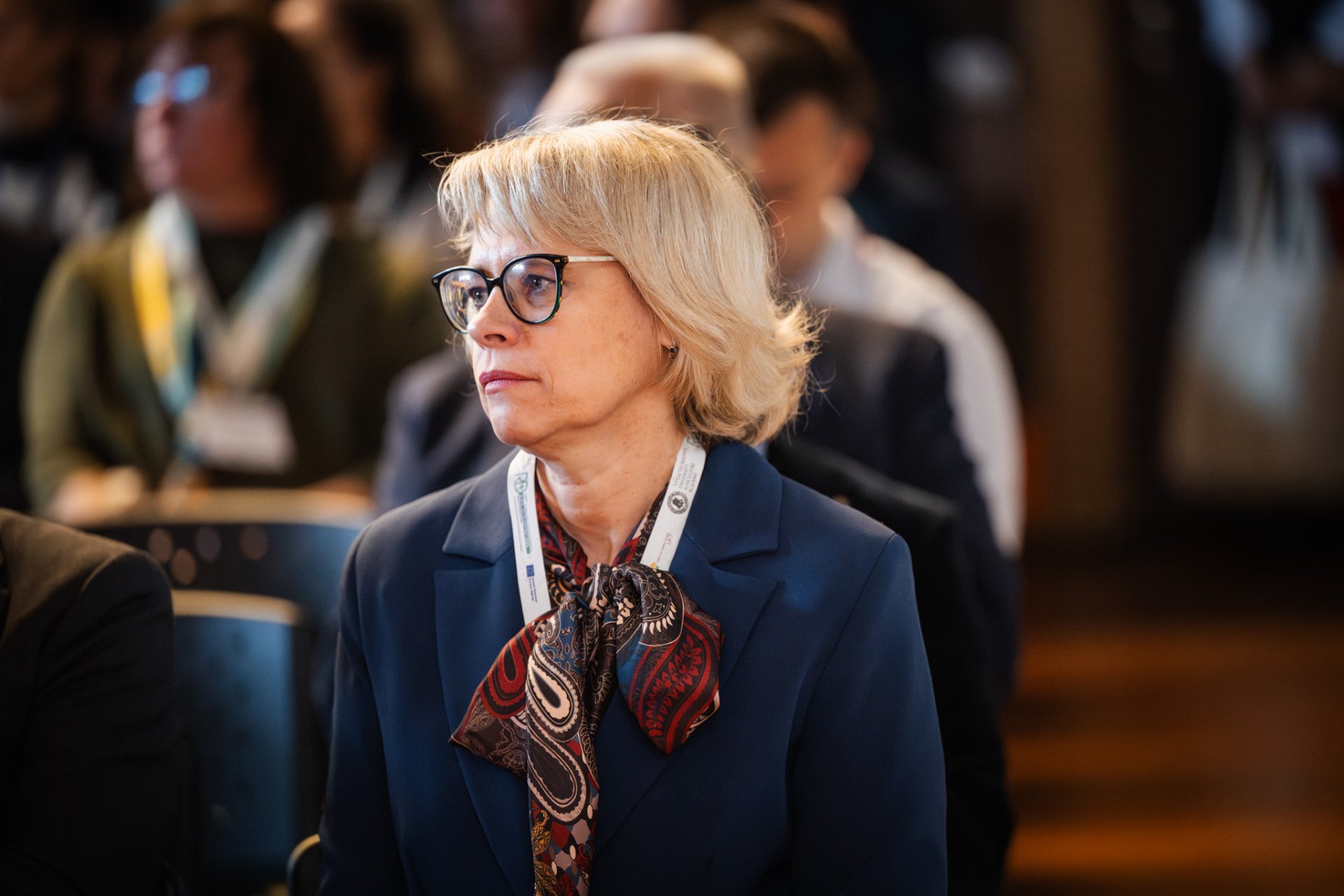International Scientific Conference “Rural Development 2025: Resilience to Global Change” – A Comprehensive Approach to a Sustainable Future

On October 1–3, the Vytautas Magnus University Agriculture Academy (VMU AA) hosted for the twelfth time the international scientific conference “Rural Development 2025: Resilience to Global Change”, which became a vibrant hub of knowledge exchange and international dialogue. This year’s conference theme – resilience to global changes – encouraged participants to share experience and insights and to address issues related to climate change, biodiversity loss, geopolitical challenges, and other regional and global problems in order to develop effective and sustainable rural development strategies.
Sharing Knowledge as a Driver of Meaningful Change
This year, the international scientific conference “Rural Development 2025: Resilience to Global Change” brought together 366 scientists, researchers, and guests from 22 countries – Finland, Sweden, Japan, Germany, Greece, Malaysia, Poland, Latvia, Spain, the Czech Republic, Slovakia, Albania, Kenya, Estonia, Portugal, Belgium, Mozambique, Morocco, the Netherlands, France, and Ukraine.
The event stood out for its high level of international engagement, having been organized in cooperation with global partners: AgroSERV – Agroecology European Research Infrastructure Services (France) and Forschungszentrum Jülich (Germany).
In her welcoming address, Professor Dr. Astrida Miceikienė, VMU Vice-Rector for Strategic Development and Finance and Chair of the Conference Scientific Committee, emphasized that this well-established conference unites scientists, policymakers, practitioners, and community leaders from various countries.
“The VMU Agriculture Academy is proud to serve as a space where knowledge, ideas, and experience are shared and exchanged in pursuit of a sustainable future.
This year’s central theme – resilience to change – is of particular importance. Agriculture, forestry, and rural communities worldwide are facing tremendous challenges: climate change, biodiversity loss, geopolitical shifts, bioeconomy development, demographic and social transitions, and more.
Therefore, this conference is dedicated to dialogue, exchange, and inspiration. I hope that the knowledge shared here will contribute to meaningful transformations within communities and beyond,” said Prof. Dr. A. Miceikienė.
Professor Dr. Astrida Miceikienė, VMU Vice-Rector for Strategic Development and Finance and Chair of the Conference Scientific Committee
New Perspectives: From Research to Practice
Transitioning toward a sustainable agricultural system requires a strong research infrastructure that bridges disciplines and fosters innovation.
Dr. Michel Boër, Director General of AnaEE-ERIC, the European Research Infrastructure Consortium for the Analysis and Experimentation on Ecosystems, delivered a presentation entitled “Transdisciplinary services for the research community in agroecology: the AgroServ project”. Dr. Boër has an exceptional career as a Research Director in Astrophysics at CNRS, contributing to such discoveries as gravitational waves, and now leads major initiatives in the field of agroecology. Presenting the five-year project, he explained that its goal is to support research and innovation in agriculture and agroecology, addressing the complex challenges faced by agricultural systems – including the need to feed a growing global population sustainably, combat climate change, preserve natural resources, and enhance biodiversity.
Resilient forests are vital for rural development, biodiversity, and climate adaptation.
Professor Erik Dahl Kjær of the University of Copenhagen, one of Europe’s foremost experts in forest genetics, has published over 250 scientific papers and leads a research group studying the adaptive potential of European tree species – including the latest findings in epigenetics and microbiomes.
During the conference, he presented strategies for developing forests and trees resilient and adaptive to climate change:
“We must be prepared for global changes. Priority should be given to flexible and robust measures that leave room for adaptation. International cooperation in managing forest genetic diversity is essential. Socially feasible and acceptable solutions are equally necessary. Science can combine old and new methods – and has much to offer. Let us trust in diversity and learn from nature,” said Prof. Kjær.
Sustainability in education and regional competence development is essential for a thriving bioeconomy.
Dr. Mona-Anitta Riihimäki, Dean of the School of Biotechnology and Natural Resources (Finland), whose research focuses on sustainability in the food chain and higher education governance, is a leading figure in Finland’s bioeconomy education initiatives, chairing national and international committees and contributing to the evaluation of higher education programs.
In her presentation “AKIS in Finland and the role of universities of applied sciences in regional competence creation in Bioeconomy” Dr. Riihimäki highlighted several key directions: ensuring effective knowledge transfer and strengthening the link between research and practice both within and beyond the agricultural sector; promoting strong and cross-sectoral knowledge exchange, training, and advisory services; reinforcing cross-disciplinary innovation in and beyond agriculture; supporting digital transformation in and beyond the agricultural sector.
Innovative Solutions for a Resilient and Efficient Agriculture
The ambition to ensure food security while protecting ecosystems requires plant health and sustainable farming solutions.
Professor Dimitrios Tsitsigiannis from the Agricultural University of Athens (Greece), with over 30 years of experience in plant pathology, leads a research group that develops advanced integrated plant protection strategies combining biological control, artificial intelligence, and digital precision agriculture.
In his presentation “The Power of Digital Technologies for Plant and Environmental Protection” Prof. Tsitsigiannis outlined breakthroughs in agricultural biotechnology and plant disease management:
“Agricultural biotechnologies are at the forefront of addressing climate change challenges and ensuring food security.
Advances in synthetic biology, microbiome-based solutions, and RNA-based plant protection open new levels of resilience.
AI-driven breeding platforms accelerate the creation of drought-resistant seeds, disease-tolerant crops, and biologically enhanced fertilizers.
Microbiome-based innovations enrich soil biodiversity and optimize plant nutrition, ensuring higher yields even under extreme conditions,” he said.
Addressing global challenges requires innovative thinking at the intersection of land management, climate change adaptation, and sustainable livelihoods.
Professor Hossein Azadi from Ghent University (Belgium), who holds doctorates in agricultural economics and human geography, has published nearly 400 peer-reviewed scientific papers and ranks among the top 3% of scientists worldwide.
In his presentation “Resilient Agriculture through the Lens of Smallholder Farmers: Developing Tip-Tap Early Warning System” Prof. Azadi emphasized that agriculture faces growing risks from climate change, where even small environmental fluctuations can cause irreversible, productivity-threatening impacts. Smallholders, being particularly vulnerable, often lack timely access to early warning mechanisms to mitigate such risks.
To address this gap, the Tip-Tap Early Warning System was introduced – an innovative, proactive monitoring framework designed to anticipate and prevent climate disruptions before they occur. The system strategically identifies and responds to critical tipping points to enhance resilience to climate change.
Innovation at the crossroads of biology and digital technologies is essential to ensure next-generation sustainable agricultural systems.
Associate Professor Dr. Viktorija Vaštakaitė-Kairienė, who combines plant physiology with practical agronomy in her research, actively contributes to the advancement of sustainable agriculture both in Lithuania and across Europe.
“Lithuania is building leadership in the bioeconomy – an economy driven by innovation.
There is a clear national commitment: the government, universities, and industry work hand in hand, recognizing agriculture, forestry, and biotechnology as engines of sustainable growth.
With a century-long legacy, the VMU Agriculture Academy holds a central position, and its academic division – the Bioeconomy Research Institute – serves as a research hub focused on digital agriculture, biotechnology, and climate-resilient farming.
These efforts not only address local challenges but also strengthen Lithuania’s role as a European source of knowledge. Lithuanian experts contribute to shaping EU policy and participate in international projects,” said the Deputy Director of the VMU Agriculture Academy’s Bioeconomy Research Institute.
Policy, Science, and Business Discussion: Highlights of the Forthcoming EU Bioeconomy Strategy
During the conference, Dr. Michael Losch, representative of the European Commission’s Directorate-General for Agriculture and Rural Development (DG AGRI), presented the forthcoming EU Bioeconomy Strategy.
Dr. Rasa Pakeltienė, coordinator of the Lithuanian Bioeconomy HUB and Associate Professor at the VMU Agriculture Academy’s Faculty of Bioeconomy Development, shared insights from the perspective of the national strategy and the Lithuanian Bioeconomy HUB participants.
A policy–science–business discussion followed these two keynotes, joined by Dalia Miniataitė, Senior Adviser at the Ministry of Agriculture of the Republic of Lithuania; Rugilė Skvarnavičiūtė, Product Strategist at the Lithuanian Investment Promotion Agency “Invest Lithuania”; Dainius Kižauskas, Director of the Association of Lithuanian Agricultural Cooperatives; Justinas Taruška, CEO of the biotechnology company “Nando”; and Dr. Michel Boër, Director General of AnaEE-ERIC – the European Research Infrastructure Consortium for the Analysis and Experimentation on Ecosystems.
The discussion, moderated by Virginija Kargytė, Vice President of the association “LithuaniaBIO”, explored the key directions of the upcoming EU Bioeconomy Strategy, major trends in Europe’s bioeconomy industries, and Lithuania’s potential to expand the production of innovative, high value-added bioeconomic products and related services.
Integrating Disciplines – A Comprehensive Approach to Contemporary Issues
During the conference, scholars exchanged insights and experiences across four thematic sections:
“Biosystems Engineering for Sustainability”, “A Multifunctional Approach to the Sustainable Use of Biological Resources”, “Climate-Resilient Agriculture and Food Technologies” and “Social Research and Innovations for Strengthening Rural Areas.”
According to Dr. Laima Skauronė, Researcher at the VMU Agriculture Academy’s Bioeconomy Research Institute and Chair of the Conference Organizing Committee, the event integrated not only agricultural topics but also perspectives from the social, engineering, environmental, economic, and political sciences.
“Such integration of different disciplines enables a complex exploration of rural development issues – from technological innovations to social solutions,” said Dr. Skauronė.
She added that the international conference focused on the challenges and opportunities of sustainable rural development and transformation, bioeconomy growth, agroinnovation deployment, and social responsibility in the context of global change.
“We are united by a shared goal and vision – to examine, discuss, and strategize how bioeconomy businesses and rural communities can adapt, thrive, and lead in an era of rapid and often unpredictable transformation,”
emphasized Professor Dr. Astrida Miceikienė, VMU Vice-Rector for Strategic Development and Finance and Chair of the Conference Scientific Committee.
As per tradition, the conference also featured a poster session, providing researchers with the opportunity to present their work visually and engage in direct discussions with attendees. These sessions enriched the core conference themes through additional topics and perspectives.
Dr. Laima Skauronė, Researcher at the VMU Agriculture Academy’s Bioeconomy Research Institute and Chair of the Conference Organizing Committee
International Cooperation as a Catalyst for New Scientific Partnerships
Dr. Laima Skauronė, Researcher at the VMU Agriculture Academy’s Bioeconomy Research Institute and Chair of the Conference Organizing Committee, expressed delight at the large number of participants – attendees came from 22 different countries.
In total, the conference featured 157 presentations, including six inspiring plenary lectures.
According to Dr. Skauronė, the plenary and section discussions revealed that resilience to global changes in the context of rural development is a crucial topic not only for Europe but also for global agricultural sustainability.
She emphasized that the VMU Agriculture Academy has become a platform for sharing best practices and experiences:
“Participants from various countries had the opportunity to compare their research findings in a broader international context, share insights, and learn from one another.
For example, successful rural development initiatives in France, Germany, or Japan may inspire new solutions in Lithuania – and vice versa.
Internationality also fosters the creation of new research collaborations: many scholars who meet at this conference later embark on joint projects and prepare international research proposals.
This long-term impact extends well beyond the event itself.”
Dr. Skauronė added that the broad geographical diversity of participants created a multicultural environment, promoting a wider understanding of global change, challenges, and problems.
“Such openness to the world increases both the visibility of the University and of Lithuania in the international scientific arena, showcasing our active role in addressing issues of rural development and bioeconomy resilience to global changes,” she said.
The 12th International Scientific Conference “Rural Development 2025: Resilience to Global Change” stood out for its global scope – in both content and participation.
Foreign guests were especially impressed by the cultural program of the event – the Gala Dinner evening, filled with Lithuanian traditions. The warm atmosphere was created by the VMU Agriculture Academy folk band “Ūkininkas” and the dance ensemble “Sėja”. Music, songs, and dances became a cultural bridge connecting participants from different countries and revealed the spirit of Lithuanian hospitality and international fellowship.
Conference participants also had the opportunity to explore Kaunas city, visiting historical and cultural landmarks during a guided tour, and on the final day, enjoyed the serene beauty of the Birštonas resort, which left a lasting impression with its cozy atmosphere and harmony with nature.
Summarizing the event, Professor Dr. Astrida Miceikienė, Chair of the Scientific Committee, stated that although the next conference will take place only in 2027, planning has already begun regarding its thematic continuity, new international partnerships, and a deeper dialogue between science and practice – to further strengthen the University’s role in shaping Europe’s rural development and bioeconomy directions.
The organizers extend sincere gratitude to the conference partners and sponsors – AgroServ ERSAC, Jülich Forschungszentrum, SRH University, the Lithuanian Rural Network, the Research Council of Lithuania, the Bioeconomy Research Institute’s Centre of Excellence for Bioeconomy Research (BioTEC) at the VMU Agriculture Academy, AB Kauno Grūdai, and UAB Mantinga – for their significant contribution and support.
The event was implemented under Project No. LKT-PK-24-2-06554-PR001, financed through the Lithuanian Rural Network measure of the Lithuanian Agricultural and Rural Development 2023–2027 Strategic Plan.
The project was supported by the European Agricultural Fund for Rural Development (EAFRD) and the budget of the Republic of Lithuania.
The scientific event also received funding from the Research Council of Lithuania (LMTLT) under Agreement No. P-MOR-25-23.
















